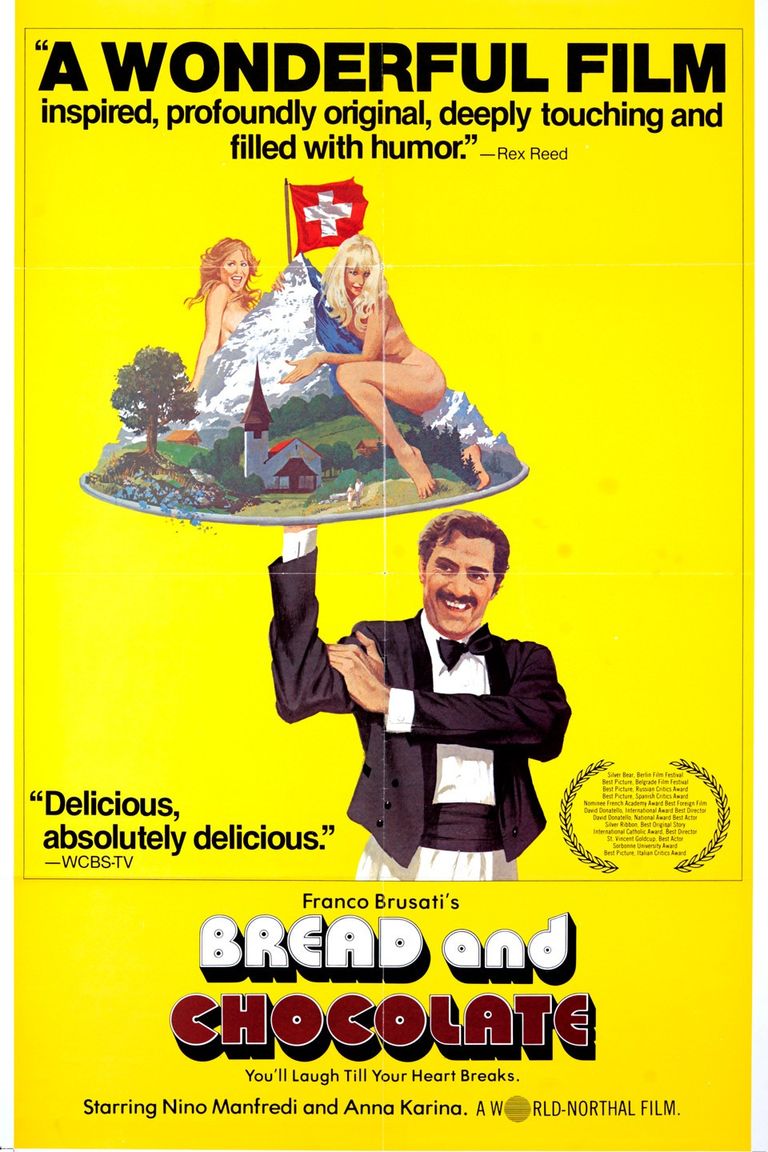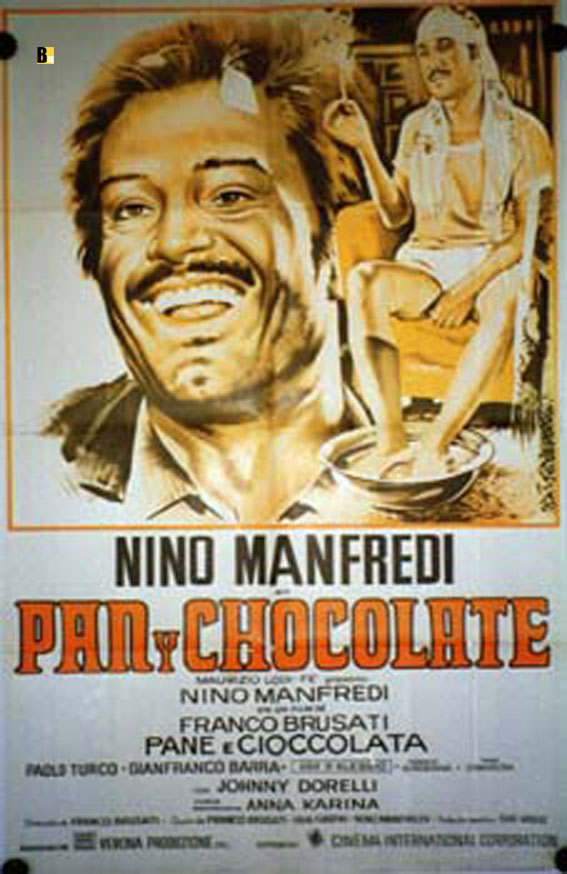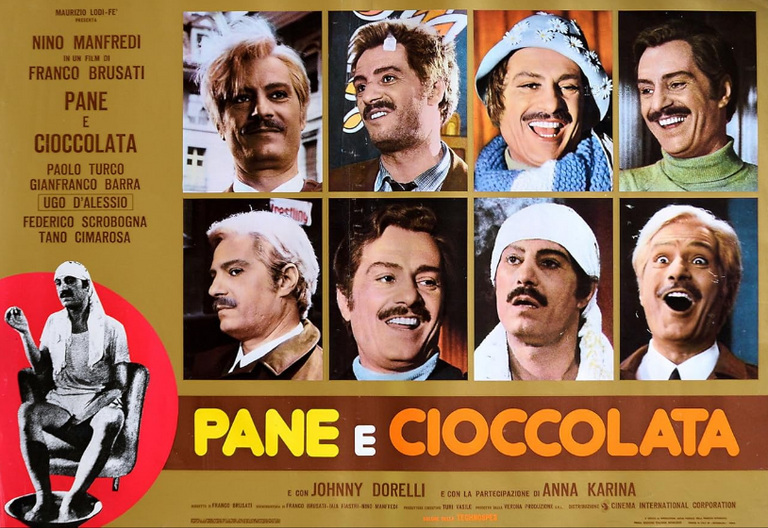
Bread and Chocolate is a 1973 film directed by Franco Brusati and starring Nino Manfredi. Its theme is Italian emigration to Switzerland.
Considered one of Manfredi's best films, thanks also to Brusati's screenplay and direction, which perfectly keeps drama and humor in harmony. The film, which won various film awards, was later included, as a representative work, in the list of 100 Italian films to save.

After three years spent in Switzerland, away from family and friends, in the frantic search for a decent job, a benevolent future seems to be on the horizon for Giovanni Garofoli , known as Nino, a Ciociaria waiter on probation at a prestigious restaurant. The hope, however, of obtaining the much-desired permanent job is dashed by a photograph given to the police which portrays him, behind a woman, urinating on a wall.
Expelled for such a trifle, Nino does not give up and, although he now resides in the country as an illegal immigrant, he tries to get back on top.
Hosted for a few days by Elena, a Greek exile who dissidents of the colonels' regime, Nino entrusts himself to an Italian billionaire who has fled to Switzerland for tax crimes and illicit export of capital, whom he met one evening when he was still working at the restaurant, to whom he even hands over his meager and hard-earned savings in the hope of being hired as his personal valet. The industrialist hires him but, now bankrupt, takes his own life, leaving him without work, money and, above all, a residence permit.
At this point he tries to settle with other Italian illegal immigrants who live in a chicken coop shared with the same hens that they have to kill and pluck for work. Shocked by the degraded existence to which his fellow countrymen are relegated, he decides, for a sort of ethnic mimesis, to dye his hair blonde and try to "integrate" with the Swiss. But, having found himself in a bar where a television is broadcasting an Italian match, he continues, albeit somewhat awkwardly, to play the part of the blond Swiss until the Italian team scores a goal, an event in the face of which Nino, unable to hold back the irrepressible joy, he explodes in a liberating scream.
Once this pathetic attempt at integration also fails, he decides to return to his homeland and prepares to leave by train. Just then he receives the long-awaited residence permit for another six months; it was delivered to her at the station by her Greek friend who got it thanks to her husband, a Swiss police officer. Nino, who had already decided to end his Swiss experience, leaves anyway but, as if annoyed by the attitude of some compatriots - also on their way to repatriation, intent on singing, as a consolation, Simmo 'e Napule paisà - blocks the train in the tunnel under the Simplon Tunnel, he gets out and goes back to resume his battle.

The beginning of the film is fantastic, a short sequence in which it is already clear that Nino's completely natural behaviour contrasts with the extreme sense of order and linearity that reigns around him, something that causes him a strange discomfort, making him feel inadequate, inappropriate at all times.
Regardless of the fact that migration flows have never ceased to exist, it is enough to consider that the precariousness of work resulting from the incipient (and global) ‘economic crisis’ makes it all the more urgent for many people to have to move abroad to seek more suitable job offers
The film, originally conceived for Ugo Tognazzi, underwent several changes by Manfredi himself when he took over the project in place of the Cremonese actor. The fact caused discontent and controversy upon the release of the film, with Jaja Fiastri and Franco Brusati contesting the actor's claim to be included in the credits also as a screenwriter. Manfredi, on the other hand, claimed to have made significant changes, also thanks to his first-hand experience as the son of immigrants in the United States.
The film was wonderfully received by both the public and critics, and was successfully launched in numerous European countries and in 1978 it was also circulated, albeit limited, in the United States.
AWARDS
1974 - David di Donatello
Best film
Best leading actor to Nino Manfredi
David Europeo to Franco Brusati
1974 - Berlin International Film Festival
OCIC Award to Franco Brusati
Silver Bear to Franco Brusati
Golden Bear nomination for Franco Brusati
1974 - Grolla d'oro
Best actor to Nino Manfredi
1975 - Silver Ribbon
Best subject to Franco Brusati
1978 - César Award
Nomination for Best Foreign Film for Franco Brusati
1978 - Kansas City Film Critics Circle Awards
Best foreign film
1978 - National Board of Review
Best foreign film
1978 - New York Film Critics Circle Awards
Best foreign film (Italy)
(Second place) Best screenplay to Franco Brusati


Pan y chocolate es una película de 1973 dirigida por Franco Brusati y protagonizada por Nino Manfredi. Su tema es la emigración italiana a Suiza.
Considerada una de las mejores películas de Manfredi, gracias también al guión y la dirección de Brusati, que armonizan perfectamente drama y humor. La película, ganadora de varios premios cinematográficos, fue incluida posteriormente, como obra representativa, en la lista de las 100 películas italianas a proyectar. ahorrar.

Después de tres años pasados en Suiza, lejos de familiares y amigos, en la búsqueda frenética de un trabajo digno, un futuro benévolo parece vislumbrar en el horizonte para Giovanni Garofoli , conocido como Nino, un camarero de Ciociaria en período de prueba en un prestigioso restaurante. Sin embargo, la esperanza de conseguir el ansiado trabajo permanente se ve frustrada por una fotografía entregada a la policía en la que aparece, detrás de una mujer, orinando en una pared.
Expulsado por una nimiedad así, Nino no se rinde y, a pesar de residir ahora en el país como inmigrante ilegal, intenta volver a estar en la cima.
Acogido durante unos días por Elena, una exiliada griega disidente del régimen de los coroneles, Nino se confía a un multimillonario italiano huido a Suiza por delitos fiscales y exportación ilícita de capitales, al que conoció una tarde cuando todavía estaba trabajando. en el restaurante, a quien incluso le entrega sus escasos ahorros ganados con tanto esfuerzo con la esperanza de que lo contraten como su valet personal. El industrial lo contrata pero, ahora en quiebra, se quita la vida, dejándolo sin trabajo, sin dinero y, sobre todo, sin permiso de residencia.
En este punto intenta establecerse con otros inmigrantes ilegales italianos que viven en un gallinero compartido con las mismas gallinas que tienen que matar y desplumar para trabajar. Conmocionado por la existencia degradada a la que están relegados sus compatriotas, decide, por una especie de mimesis étnica, teñirse el pelo de rubio e intentar "integrarse" con los suizos. Pero, al encontrarse en un bar donde una televisión retransmite un partido italiano, continúa, aunque con cierta torpeza, haciendo el papel del rubio suizo hasta que el equipo italiano marca un gol, hecho ante el cual Nino, incapaz de Para contener la alegría incontenible, estalla en un grito liberador.
Una vez fracasado también este patético intento de integración, decide regresar a su tierra natal y se prepara para partir en tren. En ese momento recibió el tan esperado permiso de residencia por otros seis meses; Se lo entregó en la comisaría una amiga griega que lo consiguió gracias a su marido, un policía suizo. Nino, que ya había decidido poner fin a su experiencia suiza, se marcha de todos modos pero, como molesto por la actitud de algunos compatriotas, también en camino de repatriación, decididos a cantar, a modo de consuelo, Simmo 'e Napule paisà, bloquea el tren. en el túnel bajo el Túnel Simplon, sale y regresa para reanudar su batalla.

El comienzo de la película es fantástico, una breve secuencia en la que ya queda claro que el comportamiento completamente natural de Nino contrasta con el extremo sentido del orden y la linealidad que reina a su alrededor, algo que le produce un extraño malestar, haciéndole sentirse inadecuado, inapropiado en todo momento.
Independientemente de que los flujos migratorios nunca han dejado de existir, basta considerar que la precariedad laboral derivada de la incipiente (y global) «crisis económica» hace aún más urgente que muchas personas tengan que desplazarse al extranjero en busca de ofertas de trabajo más adecuadas
La película, concebida originalmente para Ugo Tognazzi, sufrió varias modificaciones por parte del propio Manfredi cuando asumió el proyecto en sustitución del actor cremonese. El hecho provocó descontento y polémica tras el estreno de la película, con Jaja Fiastri y Franco Brusati cuestionando la pretensión del actor de ser incluido en los créditos también como guionista. Manfredi, por su parte, afirmó haber realizado cambios significativos, también gracias a su experiencia de primera mano como hijo de inmigrantes en Estados Unidos.
La película fue maravillosamente acogida tanto por el público como por la crítica, y se estrenó con éxito en numerosos países europeos y en 1978 también circuló, aunque limitada, en Estados Unidos.
PREMIOS.
1974 - David de Donatello
La mejor película
Mejor actor protagonista para Nino Manfredi
David Europeo a Franco Brusati
1974 - Festival Internacional de Cine de Berlín
Premio OCIC a Franco Brusati
Oso de Plata a Franco Brusati
Nominación al Oso de Oro para Franco Brusati
1974 - Grolla d'oro
Mejor actor para Nino Manfredi
1975 - Cinta de plata
Mejor tema para Franco Brusati
1978 - Premio César
Nominación a Mejor Película Extranjera para Franco Brusati
1978 - Premios del Círculo de Críticos de Cine de Kansas City
Mejor película extranjera
1978 - Junta Nacional de Revisión
Mejor película extranjera
1978 - Premios del Círculo de Críticos de Cine de Nueva York
Mejor película extranjera (Italia)
(Segundo lugar) Mejor guión para Franco Brusati

Source images / Fuente imágenes: IMDB.


Sources consulted (my property) for the preparation of this article. Some paragraphs may be reproduced textually.
Fuentes consultadas (de mi propiedad) para la elaboración del presente artículo. Algunos párrafos pueden estar reproducidos textualmente.
| Argentina Discovery. |  |
|---|---|
| Galería Fotográfica de Argentina. |  |
| Viaggio in Argentina. |  |
| Patagonia Express. |  |

Telegram and Whatsapp
Thanks @blurtconnect-ng!
Upvoted. Thank You for sending some of your rewards to @null. Get more BLURT:
@ mariuszkarowski/how-to-get-automatic-upvote-from-my-accounts@ blurtbooster/blurt-booster-introduction-rules-and-guidelines-1699999662965@ nalexadre/blurt-nexus-creating-an-affiliate-account-1700008765859@ kryptodenno - win BLURT POWER delegationNote: This bot will not vote on AI-generated content
Thanks @ctime!